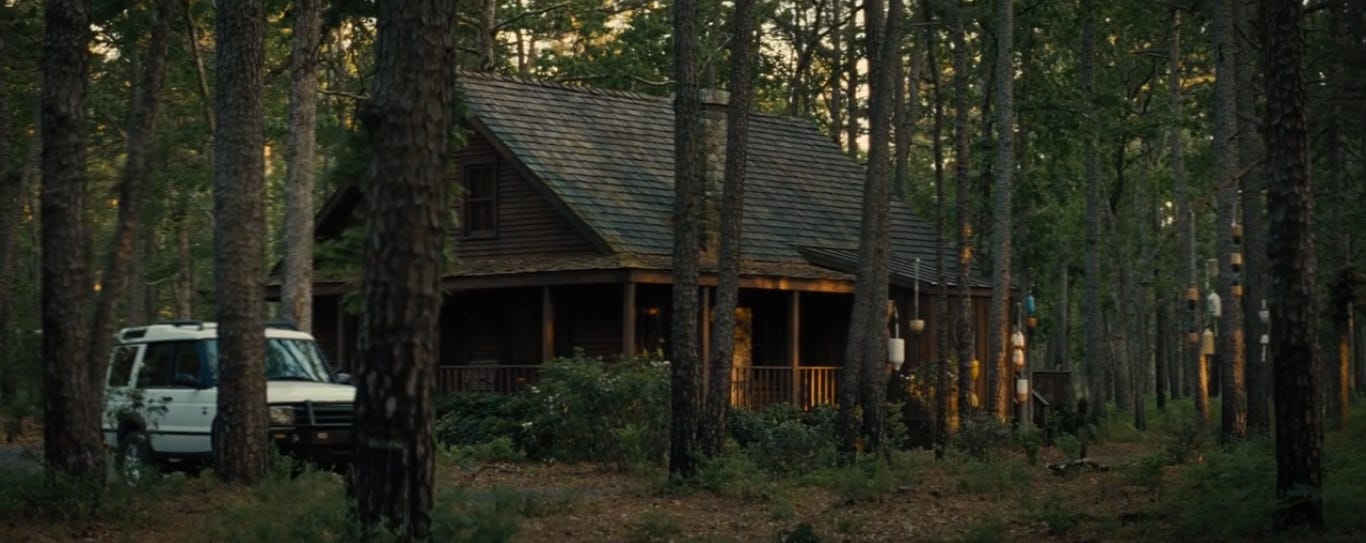M. Night Shyamalan's film offers a rollercoaster of emotions -- you're going to be tense, confused, expectant and then disappointed
Knock at the Cabin starts off quite adorably with a little girl playing with grasshoppers in front of a cabin in the woods. A large, well-dressed and tattooed man appears and introduces himself as Leonard (Dave Bautista) — he insists that he’s harmless and just wants to be friends with the little girl, Wen (Kristin Cui). Leonard keeps glancing fearfully around and making sad faces about something he has to do. The conversation reaches a peak unsettling point when Leonard is surprised that Wen has two dads and tells her he and his eerily armed friends are going to knock on the cabin door and Wen has to convince her parents to let them in because the world depends on it.
When Leonard’s armed friends appear, Wen runs inside as any thinking child would and convinces her parents to lock the doors. After a long, fraught conversation through the door, Leonard and his friends break into the cabin and restrain the inhabitants.
While the couple Andrew (Ben Aldrige) and Eric (Jonathan Groff) are beside themselves with worry (because asides being held hostage with their daughter, one of them now has a concussion), Leonard and his friends start slowly introducing themselves like they’re at a break-the-ice session. The intruders include a nurse (Nikki Amuka-Bird), a cook (Abby Quinn), a second-grade teacher (Dave Bautista) and an ex-con from a gas company (Rupert Grint). They have travelled from different corners of the United States to disturb the nice family’s vacation because they had a vision showing that a willing sacrifice from one member of the family is the only thing that can prevent an apocalypse. This vision also gave detailed directions on how to forge their own weapons but left the identity of the cabin inhabitants quite vague.
Directed by M. Night Shyamalan and adapted from Paul Tremblay’s horror novel The Cabin at the End of the World, Knock at the Cabin’s apocalyptic premise is ridiculous and made even more so by the manner the team chose to “convince” this family as well as the exaggerated character archetypes. Why barge in with weapons when your goal is to convince?
We find out later that the intruders were some version of the horsemen of the apocalypse and they represent parts of humanity but none of them is acting or reacting like a well-rounded human being. One is too anxious, another is too angry with every sentence dripping sarcasm, and another is trying so hard to project a calming persona that it comes off as exaggerated and insufferable.
Put together and it doesn’t make a very convincing experience - either for the viewers or the family members asked to willingly sacrifice someone for the good of the world. The couple is also reacting in a rather one-dimensioned manner - one is too calm and already quite accepting of the hullabaloo while another is angry and throwing logic at every situation. The horsemen threaten to end their lives (in the presence of a child!) for every refusal they get claiming that for each death, a plague will be visited on humanity; yet it’s still not convincing when the “plague” is shown on TV as another body drops.
As the gay couple is repeatedly asked to sacrifice one person, Knock at the Cabin gives glimpses of the couple’s past which was fraught with difficulties due to their sexuality. In one of the flashbacks, it is revealed that the ex-con gasman is someone from the couple’s past who was responsible for a lot of trauma. But this exciting tidbit turns out to be useless.
Why this couple? Why those four particular individuals? Why was it important that the couple was gay? Just why?
More time passes and bodies drop until there are just two left and even then we’re waiting for the “catch” as the survivors drive away from the cursed cabin. Maybe there is no apocalypse, maybe it was some type of messed-up prank, or maybe the intruders were truly delusional. Maybe. As the fate of the world is revealed, it’s clear that there is no further catch except the one that was revealed in the first thirty minutes of the psychological horror and while Knock at the Cabin was intended to foster some deep dialogue among viewers about if they’d sacrifice a family member for the world, every aspect of the film was so unconvincing that by the time the credit rolls, you’re left with just one question.
“Who on earth would have believed that?”

.png)

1 Comments
I love the title😀😀😀
ReplyDeletePost a Comment